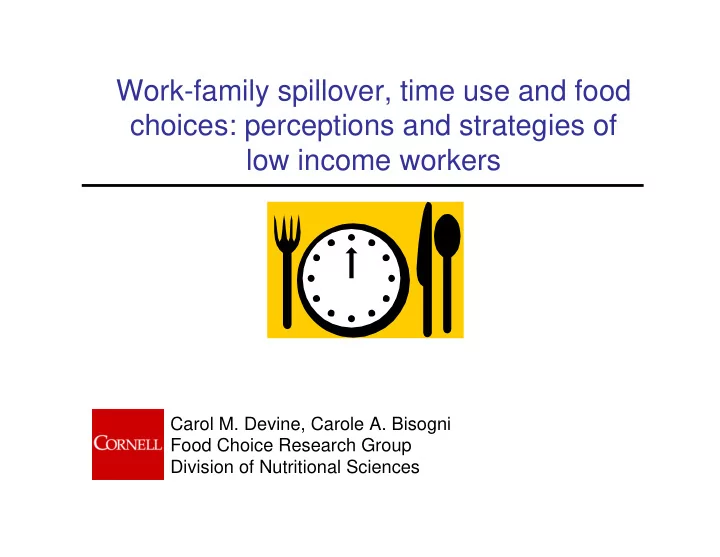

Work-family spillover, time use and food choices: perceptions and strategies of low income workers Carol M. Devine, Carole A. Bisogni Food Choice Research Group Division of Nutritional Sciences
Presentation Goals � Share insights from qualitative research on time use and food choices � Suggest implications for research & policy � Time conceptualization � Consumption conceptualization Cornell Food Choice Research August 04
Grounded Theory Approach � Understand workers’ perspectives of work, family roles, time, and food choices � Understand workers’ strategies for integrating the time pressures from work and family demands and food choices Cornell Food Choice Research August 04
Conceptual Model Work-Family Spillover and Time INDIVIDUAL CHARACTERISTICS FAMILY WORK Social Social Processes Processes ROLE SPILLOVER & Conditions Conditions INTEGRATION FOOD CHOICES Cornell Food Choice Research August 04
Data: Qualitative Qualitative interviews with purposive samples 1. Fruit and Vegetable Consumption 51 multi-ethnic low/mod. income urban workers (USDA/CSREES) (Devine, Connors, Sobal, Bisogni, Soc Sci Med 2003;56:617- 630) 2. Situational Eating 30 low/mod income rural-urban workers (USDA/CSREES-preliminary) 3. Work-Family Integration 60 multi-ethnic, low wage, urban working parents (NIH- beginning) Cornell Food Choice Research August 04
Data: Consumption Events 4. Situational Eating: 30 low/mod. income workers 24-hr non-quantitative telephone recall of consumption events over 7 consecutive days (USDA-CSREES- preliminary) Foods, beverages, water � Associated activities � Eating location � Food sources � People present � Values negotiated � Cornell Food Choice Research August 04
Qualitative Findings: Strategies to beat the clock � Skip � Simplify � Speed up � Anytime, Anyplace Consumption � Multi-task � Take turns � Anticipate Cornell Food Choice Research August 04
Qualitative Findings: Strategies to beat the clock � Trade offs � Income – multiple jobs � Education – school at night � Social – more time with family, spouse � Recreation & physical activity � Personal energy- mental & physical Cornell Food Choice Research August 04
Qualitative Findings: Consequences of strategies � Reduced self-efficacy about food choices � Guilt – no time for family or health � Compensation for time crunch by eating � Health/weight problems Cornell Food Choice Research August 04
Consumption Locations Food (n=825) & Beverage Beverage Only Only (n=195) Food (preliminary estimates) Event Fast Food Restaurant Sit-down Restaurant Vehicle Family/Friend Home Work Home 0 20 40 60 Percent Cornell Food Choice Research August 04
Multi-tasking: Activities Associated with Food Food (preliminary) None reported Self-care Travel Read Plan/Get ready Relax/Sit Childcare Recreation/Walk Housework Work/School TV/Movie/Radio Social/Talking 0 5 10 15 20 25 30 Percent Cornell Food Choice Research August 04
Multi-tasking-Activities Associated with Food Food & Beverage Only Beverage Only (preliminary) None reported Self-care Travel Read Plan/Get ready Relax/Sit Childcare Recreation/Walk Housework Work/School TV/Movie/Radio Social/Talking 0 5 10 15 20 25 30 Percent Cornell Food Choice Research August 04
Work Patterns � Food at work � Multiple food/beverage events at work � Food to break up boring job � Food for social contact � No food at work � Save time for other activities, get home on time � Eating/drinking to mark work/home transition Cornell Food Choice Research August 04
Summary: Personal food routines � People construct food routines around work and family obligations � Non-standard consumption patterns � Multi-tasking � Anytime, Anyplace eating Cornell Food Choice Research August 04
Summary: Strategies have consequences � In constructing their routines people make trade-offs � For income, education, family, taste, health, relaxation, recreation, sleep, social interaction � Trade offs have consequences � Gender differences in perception of time pressures Cornell Food Choice Research August 04
Implications: Measurement of Time � Traditional time and convenience measures may not capture the complex processes involved in people’s food choices � Conceptualization of time � Not time use but time pressures & energy demands � Time over which a person has control Cornell Food Choice Research August 04
Implications: Measurement of Consumption � Conceptualization of consumption events � What constitutes reportable eating? � How do people define consumption events? Are meals/snacks meaningful? � How do beverages and water fit in? � How does time or place of consumption affect reporting? � How do associated activities affect reporting? What was primary activity? What was secondary? Cornell Food Choice Research August 04
Implications: Research Questions � What are the costs of trade-offs? � Nutrition, health, food expenditures, self-efficacy, variety, physical activity, social connections � Question assumptions of the Thrifty Food Plans � How are gender roles related to food and eating continuing to evolve? What are the implications for individual, child, and family health? Cornell Food Choice Research August 04
Acknowledgements � Study Participants � Research Team Jared Bisogni Margaret Jastran Christine Blake Elizabeth Madore Patrick Blake Erica Reinhardt Jennifer Jabs Jeffery Sobal Elaine Wethington � Funding from USDA CSREES National Institutes of Health Cornell Food Choice Research August 04
Recommend
More recommend